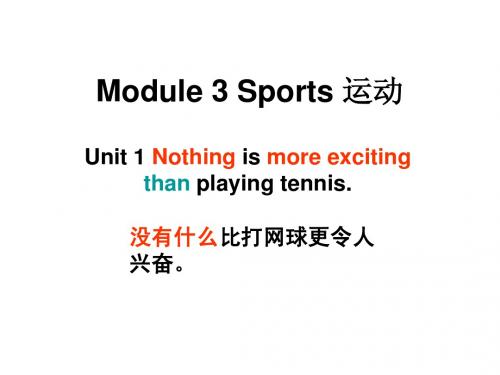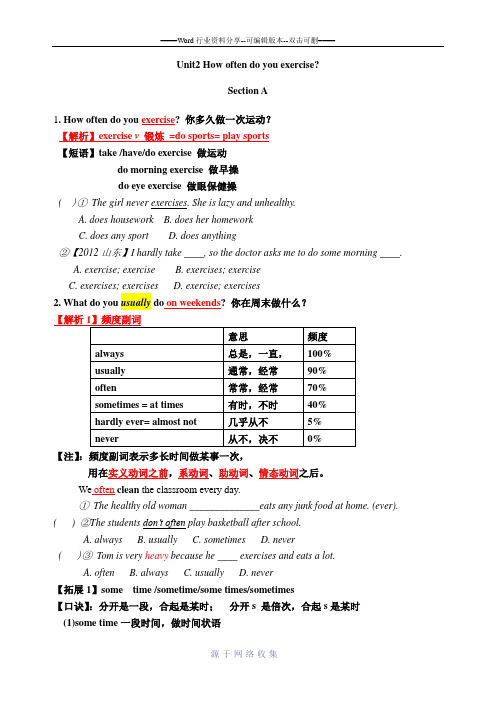八年级上册英语Unit.课文讲解
- 格式:docx
- 大小:24.82 KB
- 文档页数:6


Unit2 How often do you exercise?Section A1. How often do you exercise? 你多久做一次运动?【解析】exercise v锻炼=do sports= play sports【短语】take /have/do exercise 做运动do morning exercise 做早操do eye exercise 做眼保健操( )①The girl never exercises. She is lazy and unhealthy.A. does houseworkB. does her homeworkC. does any sportD. does anything②【2012山东】I hardly take ____, so the doctor asks me to do some morning ____.A. exercise; exerciseB. exercises; exerciseC. exercises; exercisesD. exercise; exercises2. What do you usually do on weekends? 你在周末做什么?【注】:频度副词表示多长时间做某事一次,用在实义动词之前,系动词、助动词、情态动词之后。
We often clean the classroom every day.①The healthy old woman ______________eats any junk food at home. (ever). ( )②The students don’t often play basketball after school.A. alwaysB. usuallyC. sometimesD. never( )③Tom is very heavy because he ____ exercises and eats a lot.A. oftenB. alwaysC. usuallyD. never【拓展1】some time /sometime/some times/sometimes【口诀】:分开是一段,合起是某时;分开s 是倍次,合起s是某时(1)some time一段时间,做时间状语It t akes sb some time to do sth 做某事花费某人多长时间(2) sometime adv在某个时候,(3) some times 名词词组,“几次,几倍”(4) sometimes=at times 有时(一般现在时的标志词)()①I hope to visit the USA _____ in the future.A. sometimesB. some timesC. sometimeD. some time()②They sometimes go to the movies on Saturday.A. many timesB. at timesC. one timeon weekends = on Saturday and Sunday 在周末on weekdays= from Monday to Friday 在工作日( ) The teachers never arrive late for work from Monday to Friday.A. on weekdaysB. on weekendsC. every dayD. five times a week.3.hard (1)adv 努力地,猛烈地work hard 努力工作study hard 努力学习(2) adj.困难的,艰难的=difficult◆It’s hard/difficult for sb to do sth 做某事对某人来说是困难的It’s hard for us ____________(finish) the work without other’s help.【拓展】hard ly adv “几乎不,从来不” ,表否定意义,常与can ,any ,ever 连用。

外研版,八年级,英语,上册,全部,课文,及,翻译,Module 1 How to learn EnglishUnit 1 Let’s try to speak English as much as possible让我们尽可能多地讲英语Welcome back, everyone!?同学们,欢迎回来!Today, we’re going to talk about good ways to learn English.今天,我们打算谈论一下学习英语的好方法。
Ready?%准备好了吗?Who has some advice?谁有一些建议?We should always speak English in class..在课堂上我们应该总是讲英语。
Good! Let’s try to speak English as much as possible.好!让我们尽可能多地讲英语。
Why not write down the mistakes in our notebooks?)为什么不在我们的笔记本上记下错误呢?That’s a good idea. And don’t forget to write down the correct answers next to the mistakes. What else?那是个好主意,而且不要忘记在错误旁边写上正确的答案。
还有其他的什么吗?It’s a good idea to spell and pronounce new words aloud every day.\每天大声拼读生词是一个好主意。
Thanks a lot, Lingling. How about listening to the radio?非常感谢你,玲玲。
听广播怎么样?Yes, that’s good for our pronunciation too. But there are so many new words.)是的,那也有益于我们的发音。

沪教版八年级英语上册课文原文及翻译Module 1 Unit 1 Module 1 Amazing thingsUnit 1 EncyclopaediasReadingLook it up!Here are two articles from an encyclopaedia.Da Vinci, LeonardoLeonardo da Vinci (1452-1519) was an Italian painter, inventor, musician, engineer and scientist.Da Vinci was born in the countryside.From an early age, he showed great intelligence and artistic ability.As he grew older, he learnt to do many different things.His paintings are very famous, and one, the Mona Lisa, is perhaps the most famous painting in the world.He also had many inventions.For example, his notebooks include some interesting drawings of flying machines. (See Art)DinosaursDinosaurs lived on Earth more than 60 million years before human beings.They lived everywhere on Earth.Some dinosaurs were as small as chickens. Others were as big as ten elephants. Some could even fly.Many dinosaurs ate plants. However, some dinosaurs liked to eat meat.Dinosaurs lived on Earth for more than 150 million years.Then, suddenly, they all died out. Nobody knows why.However, we can learn about them from their fossils. (See Earth history)查阅一下!下面是从百科全书两篇文章。


译林版八年级上册英语课文及翻译UNIT 8英中对照版Comic stripIt's raining. My house is all wet. Can I come in, Eddie?下雨了。
我的房子都湿了。
我能进来吗,艾迪?Sure, come in.好的,请进。
I was sleeping when it started to rain.开始下雨的时候我真在睡觉。
Didn't you hear the rain?你没有听见下雨吗?No. When I woke up, there was water everywhere!没有。
当我醒来的时候,到处都是水。
Come with me, Eddie.和我来吧,艾迪。
Why?为什么?Who will mop up the water if I go home without you?如果我不带你回家,谁去用拖把把水擦干啊?ReadingThe Taiwan earthquake台湾地震It was about two o'clock in the early morning.那大约发生在凌晨两点。
I was sleeping when the earthquake started.当地震开始的时候我正在睡觉。
At first, I felt a slight shake.起初,我感到了一阵轻微的震动。
Then I heard a loud noise like thunder.然后我听到雷鸣一般的巨响。
Soon the real noise came, like bombs under the ground.很快,真正的响声来了,就像是地下发生了爆炸。
The earth started to shake.地面开始摇晃起来。
People screamed in fear.人们恐惧地尖叫。
Some ran out of the building.一些人从大楼中跑了出去。
八年级上册第二单元Topic 3 SectionA-B一、重点句型及知识点讲解1. May I ask you some questions, Dr. Li ? ---- Sure, go ahead. 我能问你一些问题吗,李医生?当然,请问吧。
(1) 1)疑问句和否定句中,表“一些”,常用any, 不用some. 但当此疑问句表建议或请求时,Some不改成any. 如:Would you like some tea ?2)question意为“问题,疑问”,指较易解决的问题及口头回答的问题。
如:Can you answer the question?你能回答这个问题吗?【辨析】problem和question都当“问题”讲,但它们是有区别的。
Problem 通常指难以解决的问题,尤指比较困难的问题,如社会、政治和经济等。
与它搭配的动词一般是work out或solve;而question常指对某事疑惑不解需要寻找答案的问题,它常与动词ask或answer搭配使用。
如:We must solve the problem of heavy traffic in Beijing as soon as possible.我们必须尽快解决北京的交通拥挤问题。
This is a difficult question to answer.这个问题很难回答。
(2) Sure , go ahead 当然可以,请问吧!Go ahead.(口语)表示同意对方的请求,根据情况可译为“说吧”!“做吧”! 如:__Can I read the sports section ? 我可以看看体育版吗?__Yeah, go ahead.请看吧!【拓展]】(1)go ahead and do sth .赶紧做某事。
如:Go ahead and eat before everything gets cold.趁东西还没凉赶紧吃。
(2)go ahead of 在……之前去。
人教版英语八年级上册课文及翻译Unit 1【section A】R: Hi, Helen. Long time no see.H: Hi, Rick. Yes, I was on vacation last month.R: Oh, did you go anywhere interesting?H: Yes, I went to Guizhou with my family.R: Wow! Did you see Huangguoshu Waterfall?H: Yes, I did. It was wonderful! We took quite a few photos there. What about you?Did you do anything special last month?R: Not really. I just stayed at home most of the time to read and relax.里克:嗨,海伦。
好久不见。
海伦:嗨,里克。
是的,上个月我去度假了。
里克:噢,你去什么有意思的地方了吗?海伦:是的,我和我的家人去了贵州。
里克:哇!你看到黄果树瀑布了吗?海伦:是的,我看到了。
它太美了!我们在那里拍了很多照片。
你呢?上个月你做什么特别的事情了吗?里克:没做什么。
我大部分时间只是待在家里读书、休息。
【section B】I arrived in Penang in Malaysia this morning with my family.lt was sunny and hot, so we decided to go to the beach near our hotel. My sister and l tried paragliding. l felt like l was a bird.lt was so exciting. For lunch, we had something very special——Malaysian yellow noodles. They were delicious. In the afternoon, we rode bicycles to Georgetown. There are a lot of new buildings now, but many of the old buildings are still there. In weld quay, a really old place in Georgetown, we saw the houses of the Chinese traders from 100 years ago. I wonder what life was like here in the past. I really enjoyed walking around the town.What a difference a day makes! My father and I decided to go to Penang Hill today. We wanted to walk up to the top, but then it started raining a little so we decided to take the train. We waited over an hour for the train because there were too many people .When we got to the top, it was raining really hard. We didn't have an umbrella so we were wet and cold. It was terrible! And because of the bad weather, we couldn't see anything below. My father didn't bring enough money, so we only had one bowl of rice and some fish. The food tasted great because I was so hungry!7月15日,星期一今天早上我和家人抵达马来西亚槟城。
鲁教版八年级上册英语课本内容详解本文将介绍《鲁教版八年级上册英语课本》的结构。
该课本分为以下几个部分:导学案:每个单元都开设了导学案,对本单元的研究目标和重点进行了提示和概述,为学生提供了研究的导引。
单元课文:每个单元都有相应的课文,涵盖了各个语言技能的训练,包括听、说、读、写等方面。
课文内容生动有趣,贴近学生的生活和实际应用场景。
语法:课本中设置了相应的语法知识点,帮助学生巩固和扩展语法知识。
练:每个单元的练部分包括听力练、口语练、阅读理解、语法练等,帮助学生进行知识运用和技能训练。
写作:课本中特别设置了写作部分,鼓励学生进行写作训练,提高他们的写作能力和表达能力。
知识拓展:课本最后给出了一些与单元主题相关的知识拓展内容,丰富学生的知识面。
通过以上结构的设置,这本教材既注重基础知识的研究和训练,又注重学生的实际应用能力的培养,能够帮助学生全面提高英语综合能力。
Unit 1 of the "鲁教版八年级上册英语课本" introduces students to the new school year and helps them ___。
The unit is designed to make students feel e and excited about the start of the academic year.The content of Unit 1 includes:n 1: e BackThis ___ e to the students and introduces them to the unit's theme。
It sets the tone for the rest of the unit and aims to create a positive learning ___.n 2: VocabularyIn this n。
students learn new words and ___ related to school life。
2014八年级上Unit7Will people have robots?一、词组、短语:1、on computers在电脑上,2、on paper在纸上,3、live to be200years old活到200岁,4、free time空闲时间,5、in danger在危险中,6、on the earth在世界上7、play a part in sth在某方面出力/做贡献,8、space station太空站,9、look for寻找,10、computer programmer电脑程序师,11、in the future在将来,12、hundreds of成百上千的,13、the same…as与…一样,14、over and over again反复,15、get bored无聊,16、wake up醒来/唤醒,17、look like看起来像,18、fall down倒下/落下二、重要句子(语法)1、will+动词原形将要做2、fewer/more+可数名词复数更少/更多…3、less/more+不可数名词更少/更多4、try to do sth.尽力做某事5、have to do sth不得不做某事6、agree with sb.同意某人的意见7、such+名词(词组)如此8、play a part in doing sth参与做某事9、make sb do sth让某人做某事10、help sb with sth帮助某人做某事11、There will be+主语+其他将会有….12、There is/are+sb.+doing sth有…正在做…13、It is+形容词+for sb+to do sth做某事对某人来说…语法:What will the future be like?Cities will be more polluted.And there will be fewer trees.Will people use money in100years?No,they won’t.Everything will be free.Will there be world peace?Yes,I hope so.Kids will四、词语辨析:1.every与each的区别:every用来表整体adj,every最低需是三. Every word in this dictionary is important.each用来表个别。
元音(20 个)辅音(28 个)Section A 1a 用过去式表达下列词组:1. 待在家里:__________ a t home 5. 去爬山:________ to the2. 去纽约市:______ to ______________ City 6. 去海滩:______ to the __________3. 看望我的叔叔:___________ myuncle 7. 参观博物馆: _______________________4. 去夏令营:________ to _____________________1c.例题:She went to the mountains. (对划线部分提问)__________________ s he ________ (on vacati on)?2b例句:①你和别人一起去的吗?Did you go ________________ ?②你买了特别的东西了吗?Did you buy ___________ ? __________③你遇见有趣的人了吗?Did you meet ___________________________ ?④你做有趣的事了吗?Did you do ____________________________ ?⑤你为考试学习了吗(做准备了吗)Did you 一 tests?2d重点例句:①好久不见了。
__________________________________ .②你去有趣的地方了吗?Did you go __________________________ ?③你看见黄果树瀑布了吗?是的,太______ you _______ Huan gguoshu ________ ? Yes, I did. It __________________ .④我们在那里照了相当多的照片。
We ________ quite ______________ photos there.⑤上个月你做特别的事情了Did you do _____________________ last mon th?⑥我大多数时间待在家里读书休息。
I just ___________ at home ________________ the time ______________ and ________ . Grammar Focus:例句:1.没人在这里。
每个人都去度假了。
____________ w as here. Every one _______ on vacati on.2. 我为我的爸爸买了点东西。
I __________ someth ing ________ my father.3. 我什么也没买。
=I ______________________________ .(把上句改为同义句)3a 用anyone, somethi ng, anything, everythi ng, nothing 填空A: Did you do ___________ fun on your vacati on, Alice?B: Yes, I did. I went to San ya.A: How did you like it? (改为同义句)= ___________ you ________________ it?B: Well, it was my first time there, so ____________ was really in terest ing.A: Did you go with ___________ ?B: Yes, I did. I went with my pare nts.A: Did you go shopp ing? = Did you ___________________________ ? (购物)B: ________________ !(当然!)I bought ___________ for myparents, but ___________for _____________ (我自己).A: Why didn ' t you buy _____________ for ____________ ? (你自己)= ______________ buy anything for yourself ? (把上句改为同义句)B: I didn ' t really see _____________ I liked.(我真地没看到我喜欢—3b 用any thi ng, everyth ing, nothing, every one, no one (没人)填空Dear Bill,How was your vacatio n? Did you do ____________ in terest in g? (你做有趣的事情了吗?)Did __________ in the family go with you? (家里的每个人都和你去了吗?)I went to a friend ' s farm in the countryside with myfamily. _________________ was great.(一切都很棒。
)We fed some hens and baby pigs (小猪).They were so cute! The __only problem (仅有的问题)was that there was _____________ muchto do in the eveningbut read.(晚上没有事情可做除了读书。
在这里“but ”的意思是:除了)Still seemed to be bored.(然而似乎没人是烦闷的。
)(改为同义句=Still it that no one bored. )Buy for now.Section B 1a 写出下列相应的形容词1. _________________________________ 可口的,美味的:____________ 3.令人兴奋的: 5.糟糕的:2. _______________________ 昂贵的:__________________ 4.便宜的:________________ 6.无聊的: _________________________2b.读课文完成下面的句子:1. 今天早上我和我的家人到达了马来西亚的槟城市。
I ____________________ Penang in Malaysia this morni ng with my family.2. 所以我们决定去我们旅馆附近的海滩。
So we ________________________ to the beach n ear our hotel.3. 我感觉我是一只小鸟。
I ________________ I ________ a bird.4. 我们骑自行车去乔治市。
We _________ b icycles ______ Georgetow n.5. There are a lot of new ___________ (build) now, but _____________ the oldbuildings were still there.(但是许多老建筑仍然在那里.)6. 我们看到了100年前的中国商人的房子。
We saw the houses of the ________________________ from 100 years ago.7. 我想知道这儿过去的生活I wonder ________ life __________________ here in the past. (短语:in the past在过去)8. I really enjo yed ____________________ the tow n. (我真地喜欢在这个小镇周围散步。
)9. 今天的差异是多么的大啊!a ____ a day ___________ ! ________________ (感叹句,因为修饰的词是名词,故用What引导10. 我们想步行到山顶。
We wan ted to ______________ to the top.11. 但是天开始下小雨了。
But then it _______________________ a little.12. 我们等了一个多小时的火车因为车We _________ over an hour _____________ the train because there were ___________ __________ p eople.(在这里over = more than 多于,超过)13. 当我们到达上顶,雨下得很大了。
When we ______________ the top, it was rai ning really _________ .14. 因为坏天气,我们看不到山下的任何东西。
And ___________________ the bad weather, we _____________ see _____________ below.=And ____________ the weather was bad, we could see _______________ below.15. 我的爸爸没有带足够的钱。
My father didn ' t bring _________________________ .这个小男孩够聪明能把这The little boy is _____________________ to work out the problem.16. 食物尝起来—The food __________ g reat because I was so _______________ .2d根据课Anna: Hi, Jane.Jane: I ________ to Penang in ____________ .Anna: Who ________ y ou go with?Jane: I went with my ____________ .Ann a:….?Jane: The weather was hot and_________ ...so we went _____________ on the beach.(去进行滑翔伞运动)…..we __________ bicycles to …Anna: Sounds great!Jane: ….was not as good (as the first day). (第二天不如第一天好。